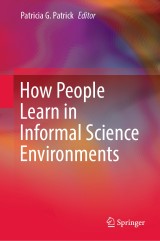Details

How People Learn in Informal Science Environments
|
139,09 € |
|
| Verlag: | Springer |
| Format: | |
| Veröffentl.: | 01.04.2023 |
| ISBN/EAN: | 9783031132919 |
| Sprache: | englisch |
Dieses eBook enthält ein Wasserzeichen.
Beschreibungen
<p>This edited volume brings together an international perspective of 22 diverse learning theories applied to a range of informal science learning environments. The book is divided into 7 sections: community of practice, critical theory, identity theory, sociocultural, socioscientific, and social entrepreneurship, systems theory, and theory development. The chapters present how researchers from diverse backgrounds and cultures use theories in their work and how these may be applied as theoretical frameworks for future research. The chapters bridge theory and practice and collectively address a wide range of ages (children-adults) and contexts. The book is written to engage a broad audience of researchers in universities and museums, while appealing to the growing number of researchers and educators who recognize the importance of informal learning to the development of environmental and scientific literacy. It is essential reading for inexperienced researchers and those seeking new theoretical perspectives.</p>
<p>Part 1: Adult Learning.- Chapter 1. Teaching About the Holocaust Through Expeditionary Learning.- Chapter 2. Conceptualising and working With a Theory of Learning for Adults Who Need to Know.- Part 2: Aquariums, Arboretums, and Zoos.- Chapter 3. The ARCS Model: Motivate Audiences and Facilitating Learning.- Chapter 4. Application of the Contextual Model of Learning and the Situated Identity Model in Informal STEM Learning Research.- Chapter 5. Socioscientific Issues and the Potential for Fostering Engagement in Informal Science Institutions.- Chapter 6. Sociocultural Theory: Defining Interactions at an Arboretum, Aquarium, and State Park.- Chapter 7. Merging Three Learning Theories to Understand How Learning Outside the Classroom Institutions Learn Themselves.- Part 3: Community Spaces.- Chapter 8. A Mobile Theory of Learning and Becoming in and Through Relations of Dignity: A Research Framing for Research Outside the Classroom.- Chapter 9. Complementing Informal STEM Education with Social Entrepreneurship.- Chapter 10. Playing to Become a Science Person: The Application of Play and Identity Theories in Two Out-of-School Settings.</p>
<p>Dr. Patrick is an associate professor at Columbus State University and a Fulbright Scholar (2019 & 2022). Her Fulbright project focused on the ways Sumatran (Indonesia) Battra, native healers, passed native medicine, environmental, and ecological knowledge to the next generation. She is the coauthor of <i>Zoo Talk</i> (Springer) and Editor of <i>Preparing Informal Science Educators </i>(Springer). Her research focuses on the importance of communicating science to the public and the relationship between communication and science literacy. Her interest is identifying how families learn and share science knowledge.</p>
<p>This edited volume brings together an international perspective of 22 diverse learning theories applied to a range of informal science learning environments. The book is divided into 7 sections: community of practice, critical theory, identity theory, sociocultural, socioscientific, and social entrepreneurship, systems theory, and theory development. The chapters present how researchers from diverse backgrounds and cultures use theories in their work and how these may be applied as theoretical frameworks for future research. The chapters bridge theory and practice and collectively address a wide range of ages (children-adults) and contexts. The book is written to engage a broad audience of researchers in universities and museums, while appealing to the growing number of researchers and educators who recognize the importance of informal learning to the development of environmental and scientific literacy. It is essential reading for inexperienced researchers and those seeking new theoretical perspectives.<br></p>
Presents learning theories across informal science learning environments Explains why the theory is important to future research endeavors Provides perspectives on learning outside the classroom
Diese Produkte könnten Sie auch interessieren:

University Science and Mathematics Education in Transition

von: Ole Skovsmose, Paola Valero, Ole Ravn Christensen

96,29 €















